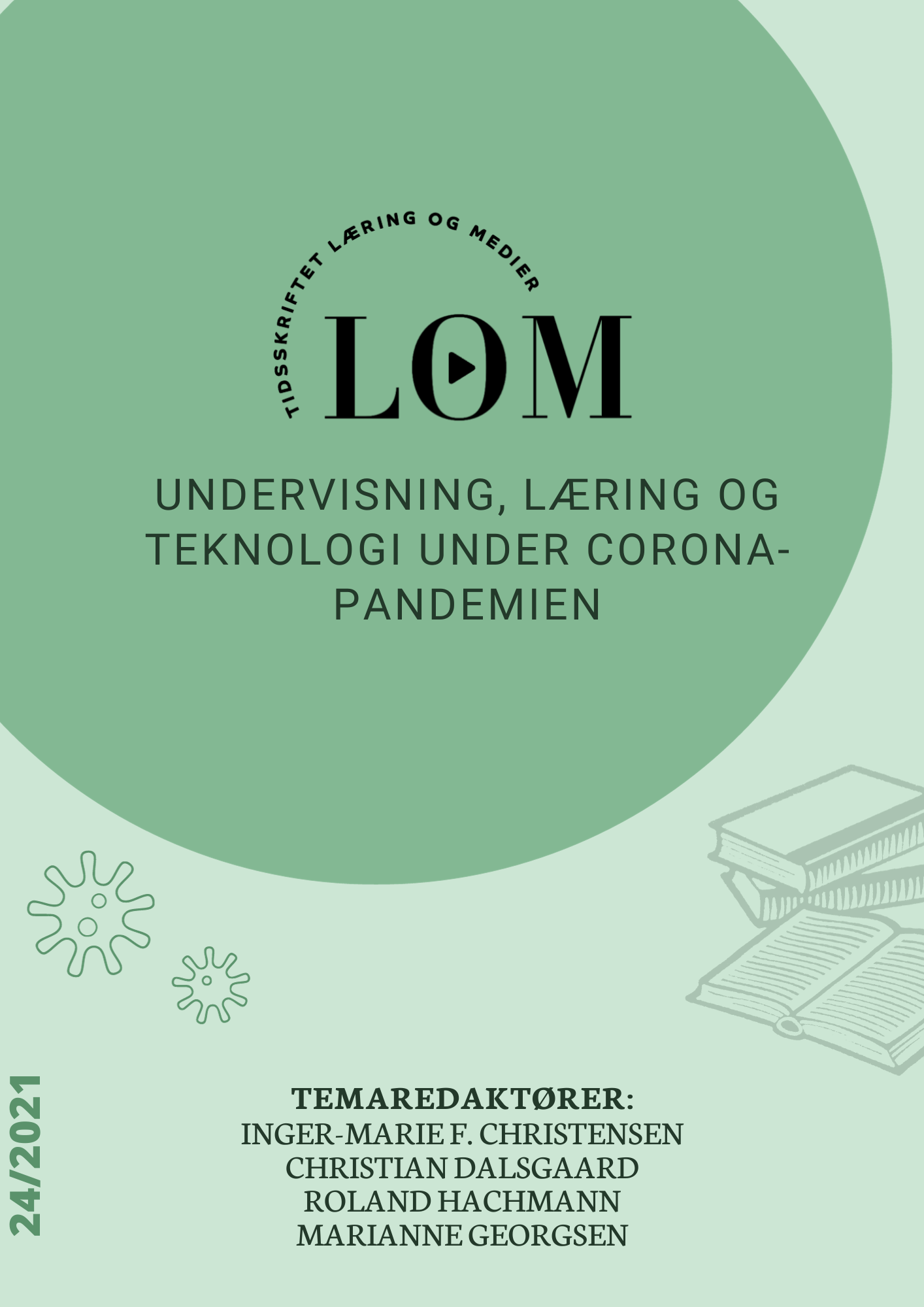Digitalt understøttet problem- og projektbaseret vejlederpraksis
Erfaringer og potentialer identificeret under COVID-19-nedlukningen
DOI:
https://doi.org/10.7146/lom.v14i24.125806Keywords:
PBL, PPL, digital læring, projektvejledning, COVID-19Abstract
This article examines teachers’ and students' experiences with digitally supported project supervision during the COVID-19 lock-down in the spring of 2020. The focus is on the philosophy behind problem- and project-based supervision at Aalborg University and Roskilde University, and how and to what extent digital transformation of supervisor practice supports and challenges this philosophy. The results are primarily based on 12 qualitative interviews with teachers and 10 qualitative interviews with students conducted as part of the project "Experiences with online teaching at 9 higher education institutions", supplemented by results from local, internal studies in the same period. Overall, this paper seeks to answer the research question: “What have we learned about digitally supported project supervision during the COVID-19 lockdown, and what experiences can we take with us into a future problem- and project-oriented supervisor practice?” The results of the study show that the lockdown period has given rise to rethinking the problem- and project-based supervisor practice, and that supervision has the potential to become more flexible, student-centered and process-oriented when transformed from primarily product orientation towards process facilitation in hybrid learning spaces.
Downloads
References
Andreasen, L. B., & Lerche Nielsen, J. (2012). ICT in Problem- and Project-based Learning: New Roles for Teachers Acting as Supervisors and Students Engaging in Collaborative Learning Processes. I T. Amiel, & B. Wilson (red.), Proceedings of World Conference on Educational Multimedia, Hypermedia and Telecommunications 2012 (s. 874-883). Association for the Advancement of Computing in Education. http://www.editlib.org/p/40855/
Andreasen, L. B., & Nielsen, J. L. (2013). Dimensions of problem based learning - dialogue and online collaboration in projects. Journal of Problem Based Learning in Higher Education, 1(1), 210-229. http://ojs.aub.aau.dk/index.php/pbl/article/view/283.
CEEDA (2021). Collaborative Engineering Education in the Digital Age. https://www.ceeda.org/
Christensen, T.S. Elf, N. & Krogh, E. (2014). Skrivekulturer i folkeskolens niende klasse. Odense: Syddansk Universitetsforlag.
Georgsen, M., & Qvortrup, A. (red.) (2021). Erfaringer og oplevelser med online undervisning på 9 videregående uddannelsesinstitutioner i foråret 2020.
Holgaard, J. E., Ryberg, T., Stegeager, N., Stentoft, D., & Thomassen, A. O. (2020). PBL: Problembaseret læring og projektarbejde ved de videregående uddannelser. Samfundslitteratur.
Kolmos, A., & Holgaard, J. E. (2007). Situationsbaseret projektvejledning. Dansk Universitetspædagogisk Tidsskrift, 2(3), 54-62.
Konnerup, U. (2020). Working Together, but Separately. In: Jandrić, P., Hayes, D., Truelove, I., Levinson, P., Mayo, P., Ryberg, T., Monzó, L. D., Allen, Q., Stewart, P. A., Carr, P. R., Jackson, L., Bridges, S., Escaño, C., Grauslund, D., Mañero, J., Lukoko, H. O., Bryant, P., Fuentes-Martinez, A., Gibbons, A., ... Hayes, S. (2020). Teaching in the Age of Covid-19. Postdigital Science and Education, 2, 1069–1230. https://doi.org/10.1007/s42438-020-00169-6
Kvale, S., & Brinkmann, S. (2009). Interview: Introduktion til et håndværk. (2 ed.) Hans Reitzels Forlag.
Lyngdorf, N. E. R., Bertel, L. B., & Andersen, T. (2021). Evaluering af Digitalt Understøttet Læring på Aalborg Universitet i 2020: Underviser- og studenterperspektiver på universitetets nedlukning som følge af Covid-19. Rapport. 34 sider. Evaluering af Digitalt Understøttet Læring på Aalborg Universitet i 2020: Underviser- og studenterperspektiver på universitetets nedlukning som følge af Covid-19 — Aalborg Universitets forskningsportal (aau.dk)
Nielsen, J. L., & Danielsen, O. (2012). Problem-Oriented Project Studies: The Role of the Teacher as Supervisor for the Study Group in Its Learning Processes. I L. Dirckinck-Holmfeld, V. Hodgson, & D. Mc-Connell (red.), Exploring the Theory, Pedagogy and Practice of Networked Learning (s. 257-272). Springer Science+Business Media. https://doi.org/10.1007/978-1-4614-0496-5_15
Olsen, P. B., & Pedersen, K. (2018). Problemorienteret projektarbejde: en værktøjsbog. Samfundslitteratur.
Ryberg, T., Bertel, L. B., Sørensen, M. T., Davidsen, J. G., & Konnerup, U. (2020, May). Hybridity, Transparency, Structured Freedom and Flipped Engagement–an Example of Networked Learning Pedagogy. In Proceedings of the Twelth International Conference on Networked Learning.
Ryberg, T., Davidsen, J., Bernhard, J., & Larsen, M. C. (2021). Ecotones: a Conceptual Contribution to Postdigital Thinking. Postdigital Science and Education, 3(2), 407-424.
Savin-Baden, M. (2000). Problem-based learning in higher education: Untold stories: Untold stories. McGraw-Hill Education (UK).
Savin-Baden, M. (2007). Learning Spaces: Creating Opportunities for Knowledge Creation in Academic Life. The Society for Research into Higher Education. McGraw-Hill Education (UK).
Qvortrup, A. (2020a). Gymnasiet anno 2019. Qvortrup, A. (red.). Gymnasiet i udvikling (s. 19-46). København: Hans Reitzels forlag.
Downloads
Published
How to Cite
Issue
Section
License
Copyright (c) 2021 Ulla Konnerup, Lykke Brogaard Bertel, Søren Larsen

This work is licensed under a Creative Commons Attribution-NonCommercial-NoDerivatives 4.0 International License.

Articles published in the Journal of Learning and Media are licensed under a Creative Commons Attribution-NonCommercial-NoDerivatives 3.0 Unported Licens.
Authors retain copyright and grant the journal right of first publication; simultaneously articles are licensend under the Creative Commons Attribution license: Attribution-NonCommercial-NoDerviatives (by-nc-nd). Read about this license at https://creativecommons.org/licenses/by-nc-nd/3.0/
---
At LOM.dk, you will also find articles from the discontinued Journal for the Continuing and Further Education of the Danish Universities (UNEV). Note that special rules apply to UNEV articles:
It is the authors and any other copyright holder who have the copyright of articles published under the auspices of UNEV, and access to the articles is contingent on users acknowledging and complying with the associated legal guidelines:
- Users may download and print one copy of any UNEV publication for private studies or research.
- The redistribution of articles or the use of these for revenue-funded activities or commercial purposes are not allowed.
- It is not allowed to distribute the URLs of UNEV articles.


